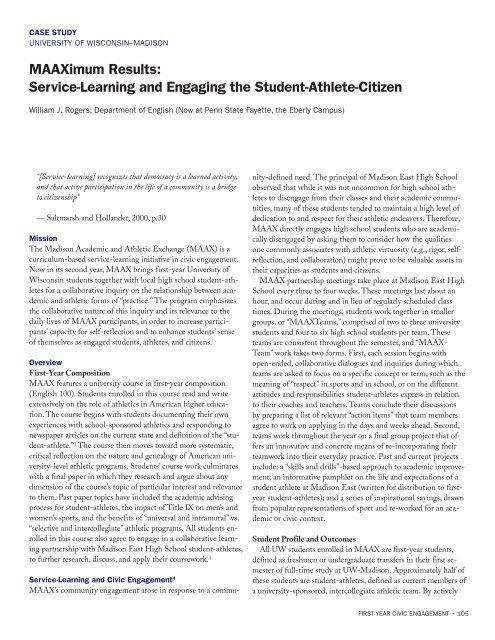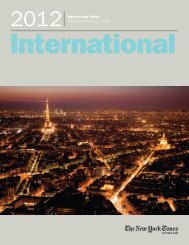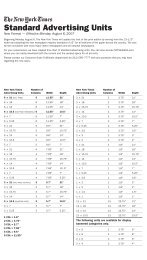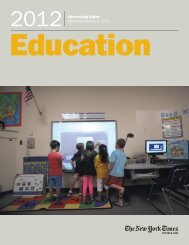ing based opportunities. Both semesters require a service logand final reflection piece. students will create and maintain a portfolio reflective of thefirst year at college. This outcome is achieved through groupinstruction, individual consultation, and resource reading.Instruction and SupportTwo faculty and one professional staff member serve as the primaryfacilitators of the community. Key departments that collectivelyor collaboratively support the community include: <strong>College</strong> of Artsand Sciences, University Life and Residence Life, University Ministry,Office of Service-Learning and Community Action, McCarthyCenter <strong>for</strong> Public Service and the Common Good, Office ofLiving-Learning Communities, Center <strong>for</strong> Global Education, andthe Associate Provost.AssessmentInitially funded by the James Irvine Foundation, the Martín-BaróScholars Community was a key component of a multi-prongedcultural diversity initiative (Educating <strong>for</strong> a Just Society) at USF.Our overarching goal, then and now, is to engage students tobecome effective leaders who will fashion a more humane andjust world. We anticipated that the Scholars would demonstrategreater leadership; improved communication skills (eloquentiaperfecta); and greater intercultural knowledge, abilities and effectivenessthan an appropriate reference group. Furthermore, weprojected that as these Scholars move into positions of increasingleadership within the University, they would have a profoundpositive effect on their fellow students, and serve as powerful rolemodels and mentors. Ultimately, as alumni of the Martín-BaróScholars Community and USF, we predict they will use the skills,experience, and knowledge gained as a foundation in their careerand personal pursuits.Our assessment design is a comprehensive strategy that includesnational and localized instruments. We assessed both theMartín-Baró students and a matched comparison group. Bothgroups were asked to complete a battery of instruments at varioustimes. Some instruments and measures were only applied to theMartín-Baró students. Enrollment data, student work, briefingswith faculty and staff, and community-specific questionnairesadded valuable dimensionality to the quantitative assessment.The Martín-Baró Scholars Community has consistently exceededthe expectations described above. Ongoing evidence demonstratesthat students are engaged and, thereby, retained at higherlevels than their peers. Collectively, each cohort of students hasacademically outper<strong>for</strong>med their counterparts. Anecdotal in<strong>for</strong>mationalso shows Martín-Baró Scholars hold significant rolesand leadership positions on campus.Within the context of civic engagement, data also demonstratethat students in the Community have, with significantly higherpercentages, participated in volunteer or community service work,socialized with someone of another ethnic group, and discussedpolitics. It is clear from student work (i.e., assignments, portfolios,reflective examinations) that the innovative assignments and integratedstrategy facilitate growth and understanding of citizenship,community, activism, social justice, and diversity.Next PhaseIn 2007-2008, the Scholars Community curriculum will shiftfrom the social sciences core to a literature-based core. The communitywill also have a theme which will serve as the framework<strong>for</strong> the course content, learning excursions and service-learning(in AY07-08, the theme is poverty). We believe these changeswill serve to further sustain the community over time and provide<strong>for</strong> consistency among all the stakeholders (faculty, staff, andstudents). More details on the philosophy and strategic planning<strong>for</strong> sustaining the community are available via the ContinuingDevelopment link in Supplemental Materials.Supplemental MaterialsThe following data sets are available online. Please visit the USFOffice of Institutional Research at http://www.usfca.edu/oir andselect USF Student Data from the right menu. The data is availableunder the heading Martín-Baró Scholars Community. Freshman Class, 2002-2004 I. Contributors’ Names and Contact In<strong>for</strong>mationLorrie Ranck, Director, Office of Living-Learning CommunitiesDavid Ryan, Professor, Program in Rhetoric and CompositionUniversity of San Francisco2130 Fulton Street, University Center 568San Francisco, CA 94117Phone: 415-422-5541Fax: 415-422-5671Email: ranck@usfca.eduII. Institutional Descriptiona. University of San Francisco, San Francisco, CAb. Four-yearc. Privated. Commuter and residential campuse. 4,395.1 traditional undergraduate FTE, fall 2005;917 first-year students, fall 2005;f. 2,060 traditional undergraduate residential students,fall 2005; 869 first-year residential students, fall 2005;2,624 traditional undergraduate commuter students,fall 2005; 48 first-year commuter students, fall 2005.
CASE STUDY MAAXimum Results:Service-Learning and Engaging the Student-Athlete-CitizenWilliam J. Rogers, Department of English (Now at Penn State Fayette, the Eberly Campus)“[Service-learning] recognizes that democracy is a learned activity,and that active participation in the life of a community is a bridgeto citizenship”— Saltmarsh and Hollander, 2000, p.30MissionThe Madison Academic and Athletic Exchange (MAAX) is acurriculum-based service-learning initiative in civic engagement.Now in its second year, MAAX brings first-year University ofWisconsin students together with local high school student-athletes<strong>for</strong> a collaborative inquiry on the relationship between academicand athletic <strong>for</strong>ms of “practice.” The program emphasizesthe collaborative nature of this inquiry and its relevance to thedaily lives of MAAX participants, in order to increase participants’capacity <strong>for</strong> self-reflection and to enhance students’ senseof themselves as engaged students, athletes, and citizens.Overview<strong>First</strong>-<strong>Year</strong> CompositionMAAX features a university course in first-year composition(English 100). Students enrolled in this course read and writeextensively on the role of athletics in American higher education.The course begins with students documenting their ownexperiences with school-sponsored athletics and responding tonewspaper articles on the current state and definition of the “student-athlete.”1 The course then moves toward more systematic,critical reflection on the nature and genealogy of American university-levelathletic programs. Students’ course work culminateswith a final paper in which they research and argue about anydimension of the course’s topic of particular interest and relevanceto them. Past paper topics have included the academic advisingprocess <strong>for</strong> student-athletes, the impact of Title IX on men’s andwomen’s sports, and the benefits of “universal and intramural” vs.“selective and intercollegiate” athletic programs. All students enrolledin this course also agree to engage in a collaborative learningpartnership with Madison East High School student-athletes,to further research, discuss, and apply their coursework. 3Service-Learning and <strong>Civic</strong> <strong>Engagement</strong> 4MAAX’s community engagement arose in response to a community-definedneed. The principal of Madison East High Schoolobserved that while it was not uncommon <strong>for</strong> high school athletesto disengage from their classes and their academic communities,many of these students tended to maintain a high level ofdedication to and respect <strong>for</strong> their athletic endeavors. There<strong>for</strong>e,MAAX directly engages high school students who are academicallydisengaged by asking them to consider how the qualitiesone commonly associates with athletic virtuosity (e.g., rigor, selfreflection,and collaboration) might prove to be valuable assets intheir capacities as students and citizens.MAAX partnership meetings take place at Madison East HighSchool every three to four weeks. These meetings last about anhour, and occur during and in lieu of regularly scheduled classtimes. During the meetings, students work together in smallergroups, or “MAAXTeams,” comprised of two to three universitystudents and four to six high school students per team. Theseteams are consistent throughout the semester, and “MAAX-Team” work takes two <strong>for</strong>ms. <strong>First</strong>, each session begins withopen-ended, collaborative dialogues and inquiries during whichteams are asked to focus on a specific concept or term, such as themeaning of “respect” in sports and in school, or on the differentattitudes and responsibilities student-athletes express in relationto their coaches and teachers. Teams conclude their discussionsby preparing a list of relevant “action items” that team membersagree to work on applying in the days and weeks ahead. Second,teams work throughout the year on a final group project that offersan innovative and concrete means of re-incorporating theirteamwork into their everyday practice. Past and current projectsinclude: a “skills and drills”-based approach to academic improvement;an in<strong>for</strong>mative pamphlet on the life and expectations of astudent athlete at Madison East (written <strong>for</strong> distribution to firstyearstudent-athletes); and a series of inspirational sayings, drawnfrom popular representations of sport and re-worked <strong>for</strong> an academicor civic context.Student Profile and OutcomesAll UW students enrolled in MAAX are first-year students,defined as freshmen or undergraduate transfers in their first semesterof full-time study at UW-Madison. Approximately half ofthese students are student-athletes, defined as current members ofa university-sponsored, intercollegiate athletic team. By actively
- Page 1:
First-Year Civic Engagement:Sound F
- Page 5 and 6:
CONTENTSivPrefaceMartha J. LaBare,
- Page 7:
Zlotkowski, Edward, ed. (2002). Ser
- Page 10 and 11:
we had the “great flood” of the
- Page 12 and 13:
Requiring civic engagement demonstr
- Page 14 and 15:
The preparation of citizens was one
- Page 16 and 17:
preparation. At its heart, this wor
- Page 18 and 19:
in it of particular interest to tho
- Page 20 and 21:
often in tension. Political partici
- Page 22 and 23:
educating students for active citiz
- Page 24 and 25:
CHAPTER 4Civic Learning: Aligning P
- Page 26 and 27:
Faces/Phases of CitizenshipFace/Pha
- Page 28 and 29:
ecome more informed and participate
- Page 30 and 31:
ReferencesAstin, A.W., Vogelgesang,
- Page 32 and 33:
photography techniques to inmates a
- Page 34 and 35:
CHAPTER 8Action Steps to Move theFi
- Page 36 and 37:
ConclusionI wish to be very clear t
- Page 38 and 39:
CASE STUDYALLEGHENY COLLEGECivic En
- Page 40 and 41:
CASE STUDYANTIOCH COLLEGECivic Enga
- Page 42 and 43:
CASE STUDYCALIFORNIA STATE UNIVERSI
- Page 44 and 45:
CASE STUDYCALIFORNIA STATE UNIVERSI
- Page 46 and 47:
CASE STUDYCHANDLER-GILBERT COMMUNIT
- Page 48 and 49:
CGCC Global Engagement:http://www.c
- Page 50 and 51:
student blog in which students are
- Page 52 and 53:
CASE STUDYTHE COLLEGE OF NEW JERSEY
- Page 54 and 55:
I. Contributors’ Names and Contac
- Page 56 and 57:
opportunities of CSU students and C
- Page 58 and 59:
needs, and expectations of the serv
- Page 60 and 61:
Although Times Talk began in Septem
- Page 62 and 63: CASE STUDYFRANKLIN PIERCE UNIVERSIT
- Page 64 and 65: We now have a comprehensive assessm
- Page 66 and 67: Another major assignment for this c
- Page 68 and 69: CASE STUDYHAMPDEN-SYDNEY COLLEGELiv
- Page 70 and 71: I. Contributors’ Names and Contac
- Page 72 and 73: Qualitative assessment begins with
- Page 74 and 75: 3. Lessons in Democracy. The IUPUI
- Page 76 and 77: CASE STUDYLEHIGH UNIVERSITYJudging
- Page 78 and 79: CASE STUDYMARS HILL COLLEGELifeWork
- Page 80 and 81: CASE STUDYMERCER UNIVERSITYInterdis
- Page 82 and 83: CASE STUDYMICHIGAN STATE UNIVERSITY
- Page 84 and 85: CASE STUDYPACE UNIVERSITYCivic Enga
- Page 86 and 87: Susan-Feather GannonProfessor, Tech
- Page 88 and 89: AssessmentData were gathered from s
- Page 90 and 91: CASE STUDYPITZER COLLEGEThe Communi
- Page 92 and 93: from people different from themselv
- Page 94 and 95: Table 1Summary of the Major Outcome
- Page 96 and 97: engaged stewards of the environment
- Page 98 and 99: HIV-positive individuals. They also
- Page 100 and 101: Students were then equipped to eval
- Page 102 and 103: the World Affairs Council (WAC), in
- Page 104 and 105: CASE STUDYTRINITY UNIVERSITYCivic E
- Page 106 and 107: I. Contributors’ Names and Contac
- Page 108 and 109: in the organization of health care
- Page 110 and 111: study and a series of retreats as p
- Page 114 and 115: engaging first-year students and st
- Page 116 and 117: CASE STUDYWEBER STATE UNIVERSITY CO







